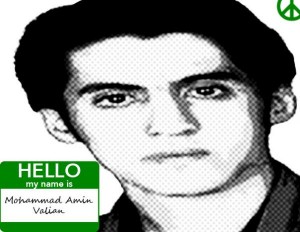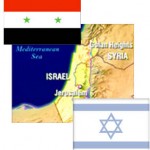
TO: The Editors of
Alef,
Farda,
Hamshahri Online,
Jahan,
Khabar Online, and
TabnakFROM: A Journalist in the "West"
Dear Sirs:
I note that on 2 March you published
an open letter to 21 American and British newspapers and magazines "
to propound some questions within the framework of the standards of our common profession at the same time reminding you of several main points concerning the way of covering Iran news in the West".
Let me say at the outset that I welcome such questions --- the journalist should never rest content that he or she has mastered this craft and has perfect skills of observation, reporting, and analysis. Let me say also that I welcome your advice as "news websites which act independently". I acknowledge, as you are at great pains to point out, that your publications have criticised the current Government; indeed, I have passed on your articles and commentary on
Enduring America. (Although I must add, in the interest of our dialogue, that this critique does not cover certain important individuals in the Iranian system, such as Ayatollah Ali Khamenei and his closest advisors.)
So, as I have read your advice, I do hope you will spare the time to consider my response.
1.
You begin: "Western journalists travel to Iran and mostly stay at hotels located in the northern part of Tehran, the capital, where the wealthy lives. Then [they] convey their observations based on what is called 'wants of Iranian people'."I think it's a fair point to ask if we have had a full picture of Iranian politics before and after the 12 June election. I agree that most coverage has come out of Tehran, just as most coverage of my country comes out of London and most coverage of France comes out of Paris.
I think it's important for journalists to break the initial bureaus of their residences, bureaus, and contacts. So why then, in this search for objectivity, did Iranian authorities confine all "Western" journalists to Tehran from June? Indeed, why did they restrict them to the residences and hotels that you deplore? Why is a Western journalist unable to go beyond his/her bus route from an Iranian press centre to Azadi Square on a day such as 22 Bahman (11 February)?
Why, when it is important to learn about all of Iran and its people are my Internet connections and those of the people who could inform me restricted?
2. "On June 28, 2009 it an unknown blog announced that a young Iranian woman, Taraneh Mousavi, had died after being sexually abused while in custody after being arrested for protesting the 2009 election results by Iran security forces....Shortly after that the blog post published, the news broke in all western media without the source being verified."I would be grateful, sirs, if you could point me to "all western media" who published this news. Apart from
a reference in The Huffington Post, taken from
The New York Review of Books, I don't recall the name of Taraneh Mousavi in the "mainstream" press.
We knew of the claim here at
Enduring America, and we did not print it as "news". We did not do so because we could not verify the story, even when it was mentioned in Mehdi Karroubi's open letter asking the Iranian Government to deal with the issues of detainee abuse.
But, sirs, if I may ask in the interest of journalism, why do you confine yourself to Taraneh Mousavi? Why do you not mention the other numerous cases of detainee abuse that have been verified, despite the restrictions on our eyes and ears? Why do you only mention deaths in Kahrizak Prison after the Supreme Leader decides that they can be acknowledged? Why do you not refer to solitary confinements, extended interrogations without charge, imprisonment without trial?
Why do you not even mention your fellow journalists who sit in those prisons?
Why?
3. On 20 June, 2009, a real girl with known identity and family was questionably shot to death around- not among- the protestors. About 2 hours later different videos captured of her death were broadcast on internet. The young doctor in the film, identified as Arash Hejazi, had entered Iran 5 days before the incident and appeared in BBC 48 hours later explaining the weird details of the story and how the nearby members of the crowd caught the shooter. Consequently the international media reflected the story accordingly.Sirs, a real girl --- whose full name you do not even mention --- was unquestionably shot to death. Neda Agha Soltan became one of many whose lives have been taken in this conflict.
The details are not "weird". A young woman, on the margins of a demonstration, was killed by a gunman. Some people dared to film the incident so it would not be lost; some very brave people, including the doctor you mention, tried to save her life; some very brave people tried to catch the assailant.
Sirs, why do you not simply acknowledge the death? Why must you substitute insinuations and vilifications to insist that she must have died to serve "Western" beneficiaries?
Did each of the dozens of people who have been killed since June --- whose faces we did not see because there was no video, whose stories we did not know because there was no Dr Hejazi or music teacher to bring them to us, in some cases whose names have not been revealed ---- die merely as pawns in a foreign plot?
Is that all, as journalists who claim to observe, you can offer?
4. During unrest in Iran, BBC Persian and The Voice of America, the Britain and USA's governments affiliated Televisions, encouraged the protesters to continue their protests on the basis of their unilateral stands. The voice of America taught their audiences the way of setting litter bins on fire and how to throw the country into chaos.I believe that the first rule of journalism when a reporter makes an accusation --- even when that accusation is against a fellow journalist --- is to have evidence. So, sirs, where is this footage, this training of protesters, this call to insurrection?
Do I do you the discourtesy of claiming that you train your audience to suppress protest, to quell dissent, to refuse thought? Do I accuse you of serving a political master? Do I allege without information, besmirch without fact?
So, since you ask about "the professional behavior of an 'informative' and 'impartial' media, why do you do so?
5. At the end of the protesters actions on 15 June 2009 in streets of Tehran, some people attacked to a Basij post, a place that kept weapons. They threw incendiary bombs and climbed up its wall in order to seize it. In your country what is the police reaction to such behavior?Sirs, in the interest of a full exchange, why do you only mention this incident and remove the context of the hundreds of thousands who protested peacefully on 15 June? Why do you not mention the excitement and hope as well as the anger and frustration, the possibility that Iranian people could freely make their concerns known in the interest of democracy and the Islamic Republic?
Why do you not mention --- for I have seen the footage of the claimed "attack" on the Basiji building --- that a few protesters were throwing Molotov cocktails at a heavily-fortified base? Why do you make up the story --- for I have seen the footage --- that they were climbing its walls? Why do you fail to mention that Iranian security forces, safe on the roof of that building, were shooting down at demonstrators? Why do you not mention that at least eight people, none of them from the security forces, died that evening?
I note your claim, "On 30 December, 2009, some people set fire to the public and private properties, police cars and banks." (I think you mean "27 December", when there was a mass demonstration on Ashura protesting for rights and justice in the name of Islam, and when a police station in Tehran was set alight.) I see your reference to the group Mujahedin-e-Khalq and their violence against the Iranian regime. I note your allegation that "Abdolmalek Rigi, the ringleader of the Jundollah terrorist group, is interviewed and introduced as a hero by the Voice of America". (Again, sirs, where is your evidence?)
But why, sirs, do you stop there? Why do you give us a fragment of "some people [who] set fire", Mujahedin-e-Khalq, and Abdolmalek Rigi as the whole picture of the post-election opposition? Who do you, who claims to represent all of Iran's people in your reporting, erase the thousands, ten of thousands, hundreds of thousands who are not firestarters, MKO terrorists, or Jundullah members?
Why do you not acknowledge those who asked, peacefully, "Where is My Vote?" Why do you not give respect to those who asked that their officials be accountable for injustices, abuses, and denial of rights? Why do you claim to see but do not see?
6. Ask your work conscience to judge if your performance has been fair and impartial or not?With respect, sirs, it is not a question of my conscience or my performance. I am but an interested observer, fortunate to have learned from many Iranian friends and colleagues.
Your question would be better directed, not to "Western" journalists", but to those who are at the centre of this story. What "conscience" has been present in the Iranian officials who, legitimately or illegitimately, hold power? What can you about their "performance"?
One of the invocations for a journalist is to "speak truth to power". Doing so, we do not try to deflect attention from our task by attacking the powerless, by setting up diversions so we ignore those who wield authority, by casting aspersions which are tangential rather than asking questions and finding answers which are essential.
I hope, sirs, that you will return to this task, and look forward to being a "Western" journalist who reports this when you do.
Scott Lucas
 Saturday, March 6, 2010 at 14:04
Saturday, March 6, 2010 at 14:04  UPDATE 6 MARCH: Iranian Students News Agency has confirmed the "mohareb" death sentence handed down to Mohammad Amin Valian. Valian's attorney says the case has not yet gone to appeal.
UPDATE 6 MARCH: Iranian Students News Agency has confirmed the "mohareb" death sentence handed down to Mohammad Amin Valian. Valian's attorney says the case has not yet gone to appeal.  Ayatollah Ali Khamenei,
Ayatollah Ali Khamenei,  Ayatollah Mohaghegh-Damad,
Ayatollah Mohaghegh-Damad,  Ayatollah Mostafa Mohaghegh-Damad,
Ayatollah Mostafa Mohaghegh-Damad,  Ayatollah Nasser Makarem-Shirazi,
Ayatollah Nasser Makarem-Shirazi,  Ayatollah Yusuf Sane'i,
Ayatollah Yusuf Sane'i,  Hashemi Rafsanjani,
Hashemi Rafsanjani,  International Campaign for Human Rights in Iran,
International Campaign for Human Rights in Iran,  Iran,
Iran,  Iran Elections 2009,
Iran Elections 2009,  Iranian Students News Agency,
Iranian Students News Agency,  Mohammad Amin Valian,
Mohammad Amin Valian,  Mohareb in
Mohareb in  Middle East & Iran
Middle East & Iran  Ayatollah Ali Khamenei,
Ayatollah Ali Khamenei,  Ayatollah Mohaghegh-Damad,
Ayatollah Mohaghegh-Damad,  Ayatollah Mostafa Mohaghegh-Damad,
Ayatollah Mostafa Mohaghegh-Damad,  Ayatollah Nasser Makarem-Shirazi,
Ayatollah Nasser Makarem-Shirazi,  Ayatollah Yusuf Sane'i,
Ayatollah Yusuf Sane'i,  Hashemi Rafsanjani,
Hashemi Rafsanjani,  International Campaign for Human Rights in Iran,
International Campaign for Human Rights in Iran,  Iran,
Iran,  Iran Elections 2009,
Iran Elections 2009,  Iranian Students News Agency,
Iranian Students News Agency,  Mohammad Amin Valian,
Mohammad Amin Valian,  Mohareb in
Mohareb in  Middle East & Iran
Middle East & Iran 



